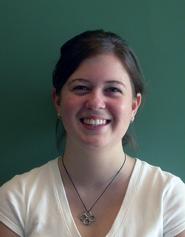
Avery Rizio '09 of Walpole, Mass. spent five weeks working with Stone
Professor of Psychology Douglas Weldon as part of the STEP/Dreyfus
program for incoming first-year students. She worked alongside Hamilton
students Christina Nemeth '06 and Erica Colligan '06 in a neuroscience
research lab.
The first project Rizio worked on is titled "Mid-brain neuronal activity as related to reward retrieval in rats." She and her group analyzed the neuron firing patterns in the superior colliculus in rats when they were exposed to two different types of rewards (a high sucrose reward and a low sucrose reward). The superior colliculus is the part of the brain responsible for the control of goal directed response towards stimuli. Knowing that the rats preferred the high sucrose reward, they implanted an electrode into the superior colliculus and recorded the number and timing of action potentials, which occur when a neuron transfers information, when the rats recognized and retrieved the rewards. They are trying to determine if reward recognition is a cognitive process; that is, if the action potentials increase when the rat recognizes the high sucrose reward or only while the rat receives the reward.
The second project involved studying the presence of calcium binding proteins in the superior colliculus of rats after tactile deprivation—cutting the whiskers on one side of their faces. Because the left hemisphere of the brain receives information from the right side of the body and vice versa, Rizio's group could study the effects of the tactile deprivation by comparing the proteins present on the left and right sides of the brain.
In addition to having no background in neuroscience, Rizio faced another difficulty by joining the team after research had begun. "Initially, it was difficult to begin working on a project that had been started five weeks ago," she explained. But she overcame the challenge and discovered that she has a strong interest in neuroscience. "I've gained exposure to an entire subject in which I had no previous experience," Rizio said, "I originally wanted to major in biology, but now I would like to major in neuroscience."
In addition to gaining experience in the lab and in the subject of neuroscience, Rizio had a unique opportunity to be on campus before her freshman year. "I met a lot of people and learned my way around campus," she said. Inspired by her experience this summer discovering neuroscience, Rizio hopes to take as many different classes in as many different departments as possible when she matriculates at Hamilton in the fall.
-- by Laura Trubiano '07
The first project Rizio worked on is titled "Mid-brain neuronal activity as related to reward retrieval in rats." She and her group analyzed the neuron firing patterns in the superior colliculus in rats when they were exposed to two different types of rewards (a high sucrose reward and a low sucrose reward). The superior colliculus is the part of the brain responsible for the control of goal directed response towards stimuli. Knowing that the rats preferred the high sucrose reward, they implanted an electrode into the superior colliculus and recorded the number and timing of action potentials, which occur when a neuron transfers information, when the rats recognized and retrieved the rewards. They are trying to determine if reward recognition is a cognitive process; that is, if the action potentials increase when the rat recognizes the high sucrose reward or only while the rat receives the reward.
The second project involved studying the presence of calcium binding proteins in the superior colliculus of rats after tactile deprivation—cutting the whiskers on one side of their faces. Because the left hemisphere of the brain receives information from the right side of the body and vice versa, Rizio's group could study the effects of the tactile deprivation by comparing the proteins present on the left and right sides of the brain.
In addition to having no background in neuroscience, Rizio faced another difficulty by joining the team after research had begun. "Initially, it was difficult to begin working on a project that had been started five weeks ago," she explained. But she overcame the challenge and discovered that she has a strong interest in neuroscience. "I've gained exposure to an entire subject in which I had no previous experience," Rizio said, "I originally wanted to major in biology, but now I would like to major in neuroscience."
In addition to gaining experience in the lab and in the subject of neuroscience, Rizio had a unique opportunity to be on campus before her freshman year. "I met a lot of people and learned my way around campus," she said. Inspired by her experience this summer discovering neuroscience, Rizio hopes to take as many different classes in as many different departments as possible when she matriculates at Hamilton in the fall.
-- by Laura Trubiano '07
Posted August 2, 2005
